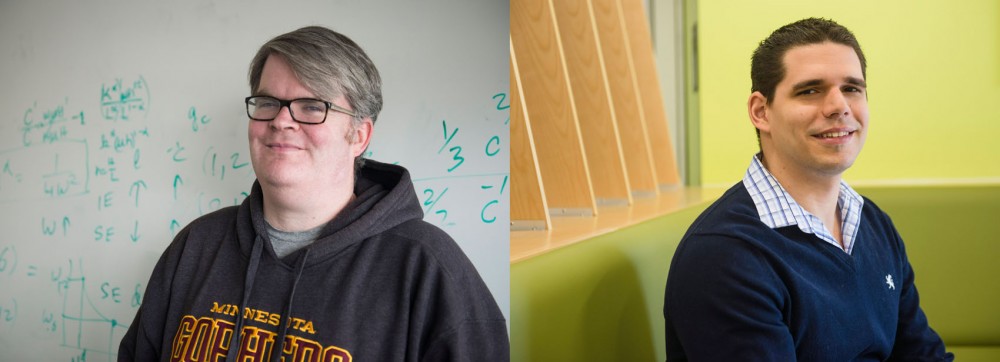As candidates for president of the University of Minnesota’s Graduate and Professional Student Assembly, Alfonso Sintjago and Scott Petty are strategizing ways to restructure the assembly’s divided leadership.
Both say GAPSA’s member councils aren’t effectively represented by its executive board, and they have similar goals for how to improve GAPSA and generate more collaboration among its members.
In the last year, GAPSA has seen a large recommended cut to its student services fees request, one of its member councils leave the assembly and the controversial election of its current president.
Sintjago, current GAPSA President Brittany Edwards and Vice President of Finance Kevin Lang all filed as candidates in last year’s election, but Sintjago and Lang both dropped out of the race before the election began.
Sintjago said the three agreed they would all file for candidacy and two would drop out, depending on their schedules.
Petty staged a write-in campaign against the three registered candidates upon hearing that two of them planned to drop out of the race.
“They said last year that the three of them were homogenous [and] that it literally didn’t matter which one of them was president,” he said.
Petty received about 35 percent of votes, with Edwards taking about half of votes.
Now, both Petty and Sintjago want to restructure GAPSA to avoid these past issues.
Petty said he believes leadership problems within GAPSA have been getting worse since last year.
“My first priority is I think some structural reform is vitally needed,” he said.
Petty is the Vice President of University Relations for the Council of Graduate Students, which voted to split from GAPSA effective this summer after having issues with the assembly.
If elected GAPSA president, Petty said, he would structure GAPSA to have a more open dialogue between the assembly’s leadership and its member councils.
“I want a GAPSA that views the councils as … kind of constituents,” he said. “I would like decisions to actually be made by the people in the assembly.”
Sintjago said he would also like to involve the general assembly more in decision making. GAPSA’s current leadership structure will likely to lead to various problems, he said.
To make sure that decisions are more collaborative among all GAPSA members, Sintjago said he wants to make a horizontal leadership structure with more dialogue between the executive board and member councils.
He said he would also like to improve the relationship between GAPSA and COGS.
It’s not effective to have two different organizations that represent the same students, Sintjago said. This could lead to graduate students becoming disengaged from student government, he said.
“Right now, it doesn’t make much sense,” he said. “Students don’t know who represents them.”
Increasing social programming
Sintjago and Petty both said they want to see GAPSA facilitate more social programming for graduate and professional students. But if the assembly’s student services fees funding is cut, its plans may not have the money needed to take off.
GAPSA received more than $392,000 from the Student Services Fees Committee for this year. It requested about the same amount for next year, but the committee’s initial recommendations offered just $176,500 for the assembly.
Sintjago, an international student from Venezuela, recently became a board member of the Council for International Graduate Students. He said he wants to incorporate more programming for international graduate and professional students who may have a hard time adjusting to the University.
“Any way we can help international students deal with some of those cultural difficulties that they have, or just to have a place to socialize, that’s important to us,” he said.
But CIGS founder Sumitra Madhuri Ramachandran said Sintjago was not supportive of CIGS in its early stages.
“GAPSA wasn’t supportive, and Alfonso had all the means to support us,” she said. “If he supports it, [then] it would be a good help because he’s been in GAPSA for three years.”
After a failed attempt getting support from GAPSA, she said, the group went to COGS, which was receptive and helped the council start up.
CIGS President Takehito Kamata said he hopes whoever is elected GAPSA president next year will support CIGS and its
programming.
“We are a new student organization, and we think that the experience and knowledge, especially from GAPSA leaders, will be very crucial to us,” he said.
Petty said he hopes to increase all social programming within GAPSA. It’s easy for graduate and professional students to not connect with students outside their programs, he said, even though it can be important for their education.
“I would like to see GAPSA do more actual programming that would target the students that pay the GAPSA fee,” he said.
But Petty said in light of the group’s recommended funding cut for next year, he’s concerned the budget won’t be able to fund much social programming.
If the current fees recommendation sticks, Petty said leadership stipends may need to be cut. If elected president, he doesn’t plan to take a stipend.


